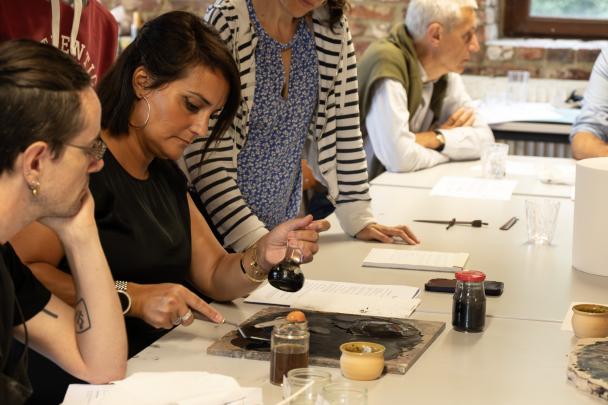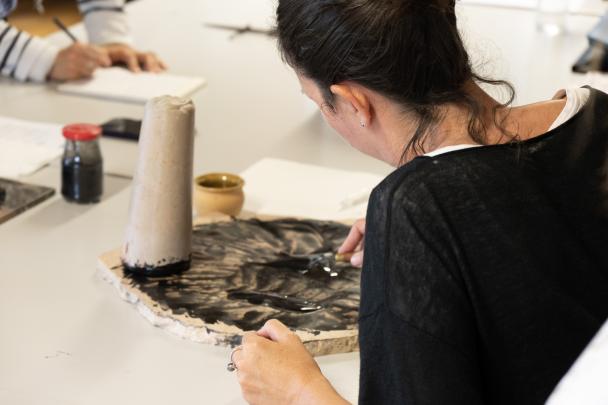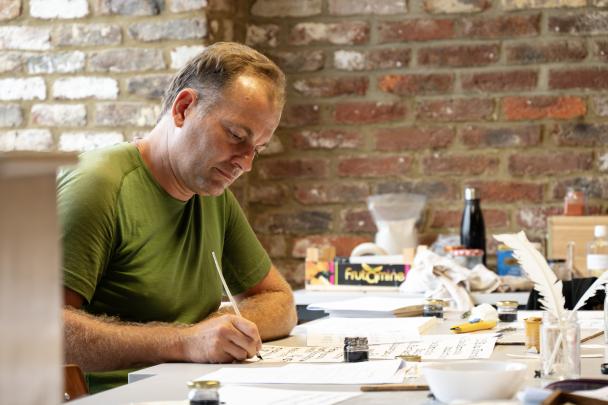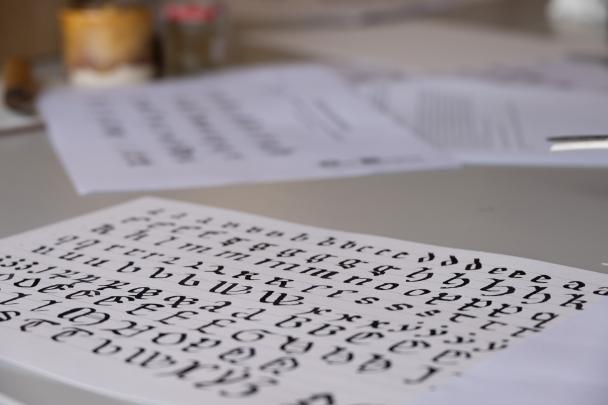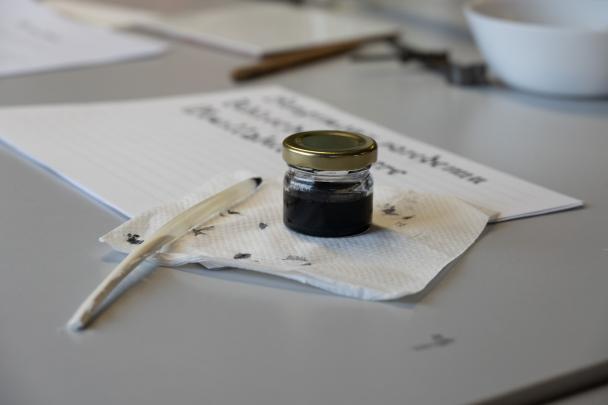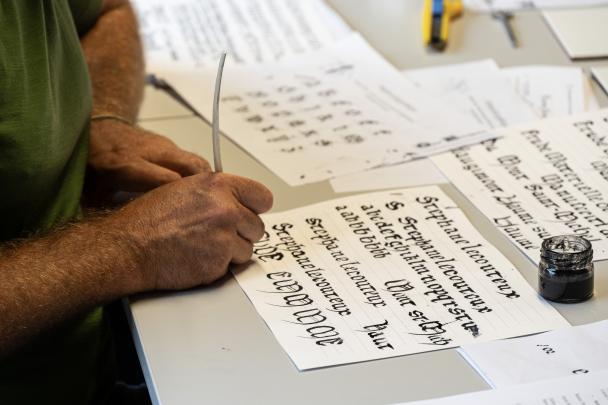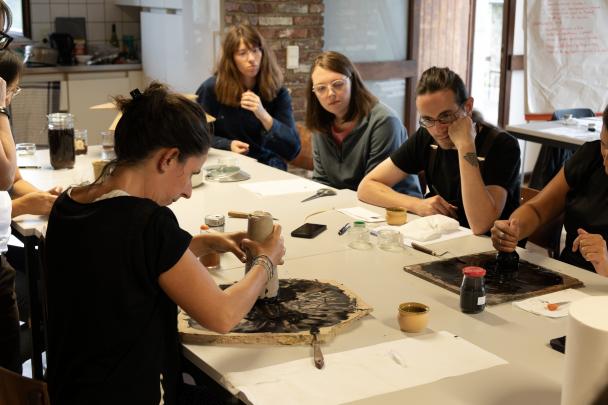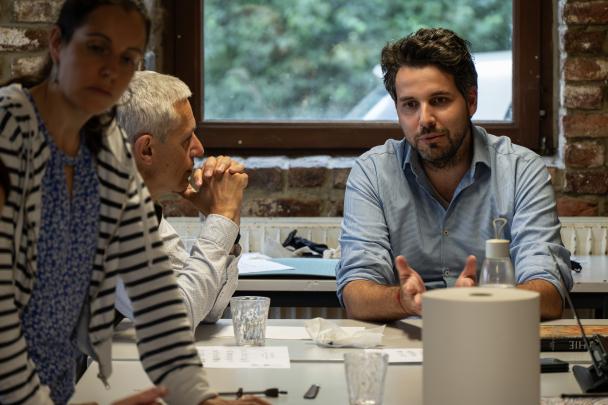NARILIS seeks to stimulate two-way interactions between basic researchers and physicians, and to build bridges between the laboratory and the patient's bedside. NARILIS therefore aims to facilitate the translation of basic research findings into clinical applications. Its mission is to promote multidisciplinary research in order to improve human and animal health and quality of life.
Un pont entre la science fondamentale et la médecine
NARILIS est fondé sur un partenariat entre l'UNamur et le complexe hospitalier CHU UCL Namur.
Grâce à ce partenariat, NARILIS favorise les interactions bidirectionnelles entre les chercheurs orientés vers la recherche fondamentale et ceux orientés vers la recherche clinique, et permet d'établir des passerelles entre le laboratoire et le chevet du patient. NARILIS offre ainsi aux scientifiques l'opportunité de mener des recherches qui ont un impact sur la santé, et finalement de participer au transfert des découvertes scientifiques fondamentales vers des applications cliniques.
Recherche multidisciplinaire et collaborative
NARILIS rassemble des scientifiques de diverses disciplines, notamment des biologistes, des physiciens, des chimistes, des géographes, des pharmaciens et des vétérinaires de l'UNamur, ainsi que des professionnels de la santé humaine du CHU UCL Namur. NARILIS encourage les groupes de recherche à passer du cloisonnement à la synergie et à travailler ensemble pour développer des projets innovants.
Six entités de recherche multidisciplinaires ont été créées au sein de NARILIS :
- Namur Thrombosis & Hemostasis Center (NTHC)
- Centre de Médecine et d'Innovation Médicamenteuse de Namur (NAMEDIC)
- Centre de Nanosécurité de Namur (NNC)
- Pôle de recherche en cancérologie de Namur
- Pôle de recherche en infectiologie de Namur (NaRePI)
- Omnibus Animalibus Studia Sanitatis (OASIS)
Spotlight
News
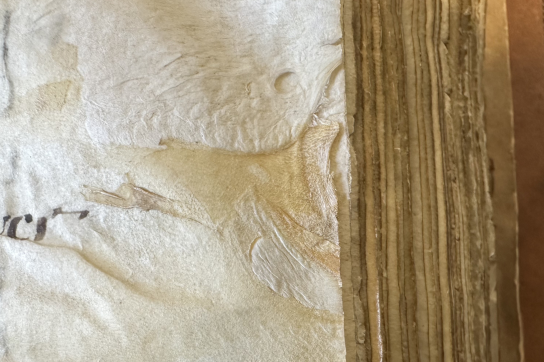
Delamination of sheepskin parchment: an interdisciplinary discovery published in Heritage Science
Delamination of sheepskin parchment: an interdisciplinary discovery published in Heritage Science
At UNamur, parchments are much more than objects of curiosity: they are at the heart of an interdisciplinary scientific adventure. Starting with historical sciences and conservation, the research has gradually incorporated the disciplines of physics, biology, chemistry, and archaeology. This convergence has given rise to research in heritage sciences, driving innovative projects such as Marine Appart's doctoral work, supervised by Professor Olivier Deparis. This research has now been recognized with a publication in the prestigious journal Heritage Science (Nature Publishing Group).
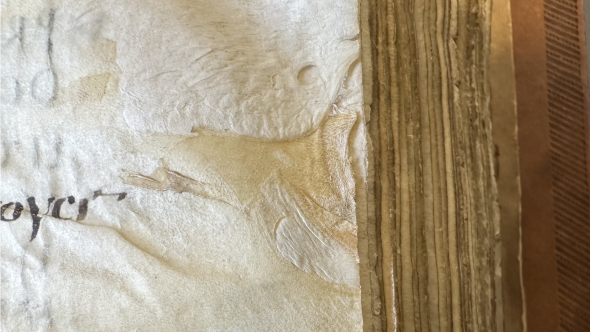
For several years now, heritage sciences have been experiencing a particularly significant boom. This deeply interdisciplinary field of research aims to foster dialogue between the humanities and natural sciences with a view to improving our knowledge of heritage objects, whether they be parchments, works of art, or artifacts discovered during excavations.
Manuscripts bear witness to ancestral practices and know-how, which unfortunately are poorly documented. It is still unclear why legal documents were preferably written on sheepskin parchment in England from the 13th century until 1925. Among the hypotheses put forward is the fact that sheepskin is whiter, and therefore more attractive, but above all that documents written on it were considered unforgeable due to the tendency of sheepskin to delaminate (any malicious attempt to erase the text would thus be revealed). This delamination property was exploited because it allowed the production of high-quality writing surfaces. It was also used to prepare strong repair pieces used to fill any tears that appeared during the parchment manufacturing process. Understanding why sheepskin delaminates is of interest in the context of traditional parchment preparation techniques, offering valuable insights into the interaction between animal biology, craftsmanship, and historical needs.
Delamination, what is it?
Delamination is the phenomenon whereby the inner layers of the skin separate along their interface as a result of mechanical stress. The diagram (a) below shows the structure of the skin, which consists mainly of the epidermis, dermis, and hypodermis. The dermis is divided into two layers, the papillary dermis and the reticular dermis, which contain hair, hair follicles, and sebaceous glands.
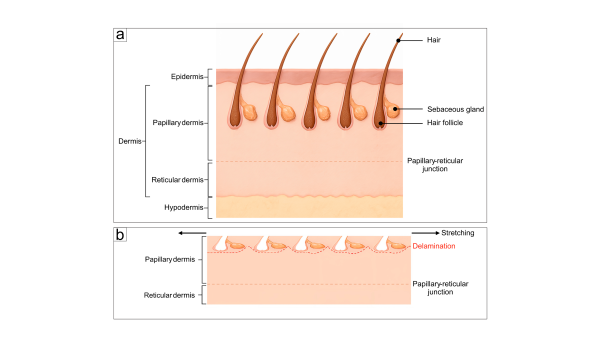
During the parchment manufacturing process, a step following liming involves scraping the skin to remove the hair. This step crushes the sebaceous glands, releasing fats and creating a void where the hair was located (diagram b).
The study showed that delamination occurs within the papillary dermis itself, in this structurally weakened area, rather than at the papillary-reticular junction as previously assumed.
The unique nature of the delamination process in sheepskin is highlighted by the skin structure, which differs from that of other animals (calves, goats) used to make parchment, as it has a high fat content associated with a large number of primary and secondary hair follicles. In the study, the presence of fats was confirmed using Raman spectroscopy.
The experimental manufacture of parchment - explained in a video!
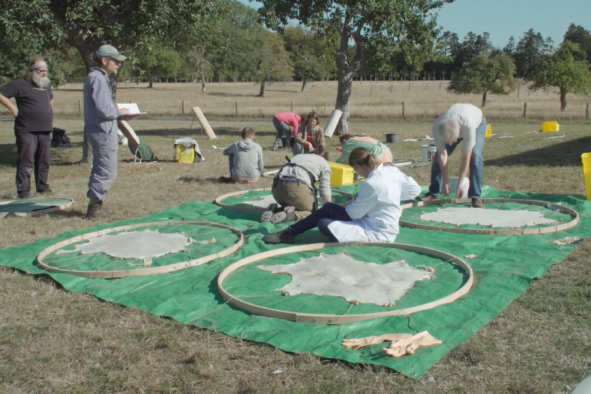
This study combines experimental archaeology and advanced analytical techniques, including scanning electron microscopy (SEM) and micro-Raman spectroscopy, to characterize the delamination process and the adhesion of repair pieces on experimentally produced sheepskin parchment. It benefits from the expertise in archaeometry, biology, chemistry, and physics of the researchers involved.
Beyond its visual and structural implications, delamination has contributed to promoting the use of sheepskin for prestigious documents, improving the surface properties of parchment. The study of the interaction between metal-gallic ink and delaminated sheepskin (wetting experiments) showed that ink diffusion and writing quality are improved, a key finding that provides insight into how surface morphology and composition influence writing performance.
An international and multidisciplinary team
At UNamur, Marine Appart, a PhD student in physics, is conducting this multidisciplinary research on the archaeometry of delamination and repairs on a sheepskin parchment under the supervision of Professor Olivier Deparis (Department of Physics, NISM Institute).
Also part of the UNamur team are:
- Professor Francesca Cecchet (expert in Raman spectroscopy), Department of Physics, NARILIS and NISM Institutes
- Professor Yves Poumay (skin specialist), Department of Medicine, NARILIS Institute
- Dr. Caroline Canon (histology specialist), Department of Medicine
- Nicolas Gros (PhD student in heritage sciences), Department of Physics, NARILIS and NISM Institutes
Other international experts
- Professor Matthew Collins (world expert in biomolecular archaeology, Department of Archaeology, The McDonald Institute, University of Cambridge, Cambridge, UK)
- Jiří Vnouček (curator and expert in parchment production, Preservation Department, Royal Danish Library, Copenhagen, Denmark)
- Marc Fourneau (biologist)
History of the study of parchments at UNamur
This study and the resulting article were inspired by the delamination experiments conducted in 2023 by Jiří Vnouček during a symposium in Klosterneuburg, Austria, in which Prof. Olivier Deparis participated. The symposium was organized by Professor Matthew Collins as part of the ABC and ERC Beast2Craft (B2C) projects.
But it all began in 2014, when the Pergamenum21 project, dedicated to the transdisciplinary study of parchments, was launched. Pergamenum21 is a project of the Namur Transdisciplinary Research Impulse (NaTRIP) program at the University of Namur. The project received an additional grant in 2016 from the Jean-Jacques Comhaire Fund of the King Baudouin Foundation (FRB).
The projects and events followed one after another, including:
- May 2014: a transdisciplinary seminar on parchment, the scientific techniques used to characterize this material, and historical questions at the Mauretus Plantin Library (BUMP)
- May 2017: "Autopsy of a scriptorium: the Orval parchments put to the test of bioarchaeology," a transdisciplinary research project co-financed by the University of Namur and the Jean-Jacques Comhaire Fund of the King Baudouin Foundation
- April 2019: a publication in Scientific Reports, Nature group - Jean-Jacques Comhaire Prize: discovery of an innovative technique based on measuring the light scattered by ancient parchments. This technique makes it possible to characterize, in a non-invasive way, the nature of the skins used in the Middle Ages to make parchments
- September 2020: a residential workshop on making parchment from animal skins at the Domaine d'Haugimont – a first in Belgium
- July 2022: a new project on parchment bindings for the restoration workshop at the Moretus Plantin University Library (BUMP) thanks to the Jean-Jacques Comhaire Fund of the King Baudouin Foundation.
- September 2024: a residential symposium-workshop at the Domaine d'Haugimont on the theme of the physicochemistry of parchment and inks using experimental and historical approaches
Overall, the work of Marine Appart and her colleagues clarifies the structural and material factors that make sheepskin parchment susceptible to delamination and offers new insights into the surface properties of this ancient writing material. UNamur is now establishing itself as a major player in parchment research.
Professor Olivier Deparis, along with several of the researchers involved in this research, are also working on the ARC PHOENIX project. This project aims to renew our understanding of medieval parchments and ancient coins. Artificial intelligence is used to analyze the data generated by the characterization of materials. This joint study will address issues related to the production chain and the use of these objects and materials in past societies.
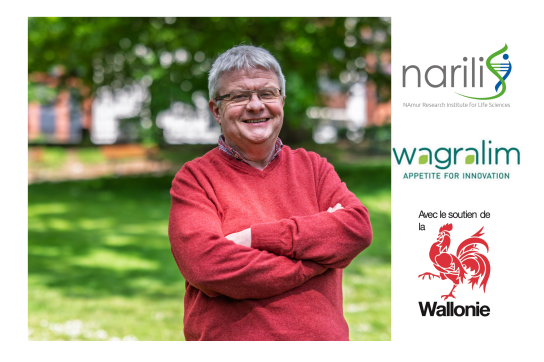
Plants against steatotic liver disease, a HEPATANT project!
Plants against steatotic liver disease, a HEPATANT project!
At UNamur, research is not confined to laboratories. From physics to political science, robotics, biodiversity, law, AI, and health, researchers collaborate daily with numerous stakeholders in society. The goal? To transform ideas into concrete solutions to address current challenges.
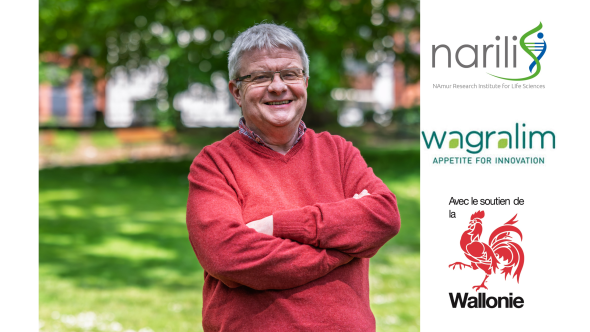
Focus #1 | The HEPATANT project
HEPATANT is a project run by the Wagralim Competitiveness Cluster and coordinated by ORTIS Laboratories, a company that has been a pioneer in the field of phytosanitary products (plant-based dietary supplements) for 60 years. It aims to find a natural treatment for fatty liver disease. Several partners are involved in the project, including Professor Thierry Arnould (UNamur, URBC-Narilis).
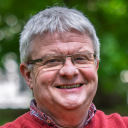
Our metabolism naturally leads to the accumulation or synthesis of fat. Certain cells are designed for this purpose: these are called adipocytes. The main goal is to be able to mobilize fat and release fatty acids "when needed." The problem is that if there is an excess of nutrients, certain cells in the body, which are not designed to do so, can also accumulate fat in tissues such as the liver, heart, or muscles, which can cause health problems. This is known as "lipotoxicity."
Metabolic dysfunction-associated steatotic liver disease (MASLD) is an accumulation of fat in the liver linked to metabolic disorders associated with metabolic syndrome, obesity, diabetes, or excessive alcohol consumption. Initially, it is often asymptomatic but can progress to inflammation, fibrosis, cirrhosis, or even liver cancer. However, it is reversible in its early stages (steatosis). Treatment is based on weight loss, a healthy diet (reduced sugar/fat intake), and physical exercise, as few specific drugs have been approved by the FDA (Food and Drug Administration) at this time. Dietary supplements—based on plants known to be beneficial—are often used to treat this type of condition, but there is little or no scientific and mechanistic evidence on the actual effects of these products.
If the effectiveness of a dietary supplement or combination of supplements could be demonstrated, it would be possible to intervene at the primary stage of the condition and undoubtedly prevent this liver disorder, thereby halting or at least slowing its progression to advanced or even irreversible stages. This is the aim of this project, in which Professor Thierry Arnould was chosen for his expertise in lipid metabolism. Professor Arnould and postdoctoral researcher Célia Thomas are testing plant extracts (including hops) in vitro on fat-laden cells to investigate the effects that increase or decrease lipid accumulation.
The originality and feasibility of the project lie in the alliance of scientific experts internationally recognized for their expertise in biomedical and pharmaceutical sciences, and in technological and agronomic sciences, with renowned industrialists in their field of expertise related to the project's needs.
In addition to its main objective of creating an effective formulation against hepatic steatosis by combining the best plants or plant substances, this project also aims to generate economic growth, create and sustain jobs in Wallonia, and contribute to the international reputation of the Walloon partner universities: UCLouvain and UNamur.
The partners of the HEPATANT project
- Prof. Thierry Arnould – UNamur, URBC, Narilis | Expertise: The URBC-NARILIS laboratory has extensive expertise and experience in cell differentiation, metabolism, and lipid metabolism in obesity and adipose cells. It also has excellent expertise in the field of hepatocytes and hepatogenic differentiation from precursors and stem cells (collaboration with Professor P. Renard, UNamur, URBC-NARILIS).
- Prof. Isabelle Leclercq - UCLouvain (IREC/GAEN) | Expertise: Pathogenesis of liver diseases in in vivo models.
- Remi Desmet – UCLouvain (Louvain University Farms - FERM) | Expertise: Agronomic research - As a UCLouvain technology platform, FERM works with farmers and partners to support the transition to more sustainable agricultural models.
- Alexandre Dumont de Chassart - Yakima Chief Hops | Expertise: Production of hops and hop-derived products.
- Caroline Devillers – Bel go Bio | Expertise: Agricultural cooperative
Competitiveness Clusters in the Walloon Region
Since their creation in 2006, competitiveness clusters have brought together companies, accredited research centers, and universities around ambitious collaborative projects. Supported and funded by the Walloon Region to stimulate innovation and economic growth, competitiveness cluster projects are organized around six strategic sectors: biotechnology (BioWin), aerospace (SkyWin Wallonia), logistics (Logistics in Wallonia), green chemistry (GreenWin), mechanical engineering (Mecatech), and food system transition (Wagralim). aerospace (SkyWin Wallonia), logistics (Logistics in Wallonia), green chemistry (GreenWin), mechanical engineering (Mecatech), and food system transition (Wagralim).
The projects aim to develop innovative products, services, or processes, creating jobs and strengthening international competitiveness. UNamur is heavily involved in these projects.
Wagralim, the Walloon agri-food cluster, has more than 300 members working to stimulate innovation and collaboration within the food ecosystem and support stakeholders in their responsible development and sustainable transition.

From fundamental to applied research, UNamur demonstrates every day that research is a driver of transformation. Thanks to the commitment of its researchers, the support of its partners from all walks of life, funders, industrial partners, and a solid ecosystem of valorization, UNamur actively participates in shaping a society that is open to the world, more innovative, more responsible, and more sustainable.
To go further
This article complements our publication "Research and innovation: major assets for the industrial sector" taken from the Issues section of Omalius magazine #39 (December 2025).
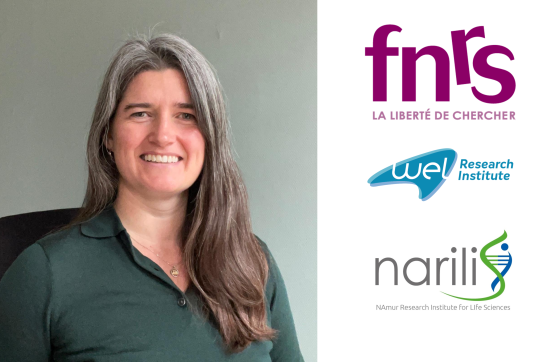
A multidisciplinary framework for protein trafficking: tackling unanswered questions
A multidisciplinary framework for protein trafficking: tackling unanswered questions
Alison Forrester is a F.R.S.-FNRS Qualified Researcher (CQ). Her research focuses on studying compounds that can modify the efficiency of protein production processes within our cells, and thus open up new therapeutic avenues. Together with a group of top international researchers, she has published a road map article in the prestigious journal Nature Reviews Molecular Cell Biology.
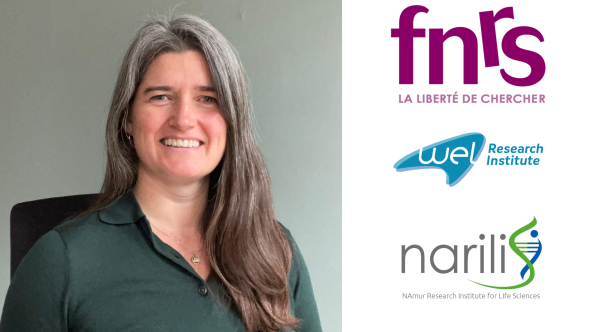
Alison Forrester is also a member of the Faculty of Science, Department of Biology (URBC), a member of the NARILIS Research Institute, a researcher at the Namur Research College (NARC), and an investigator at the WEL Research Institute.
The importance of protein trafficking in cellular health
The mammalian body is made up of proteins, lipids and water, with proteins making up 42 % of the total dry mass of a human body. Therefore, protein synthesis is a key process for the body. The biosynthetic pathway begins with amino acid chains in the Endoplasmic Reticulum (ER). They are modified, folded and then packaged into transport carriers at the ER Exit Site (ERES), transporting them to the Golgi for further modification. From there they are packaged into post-Golgi carriers to deliver the fully folded proteins to their destination, either inside the cell, or to the plasma membrane where they remain, or they are secreted into the extracellular space. Thus, efficient protein synthesis and transport is a key process to maintain homeostasis.
When it is lost, it can cause many common and varied diseases. The process is highly regulated to quickly meet the needs of the cell and the body, for example, increase in secretion of insulin in response to glucose, or increase in collagen secretion during postnatal growth, and also to ensure that no improperly made proteins are distributed throughout the cell.
When this goes wrong, it can be the cause of diseases such as fibrosis which is caused by excessive protein production, or osteogenesis imperfecta which is caused by a mutation in one of the ERES proteins.
Alison’s research group studies how different compounds can be used to modify the efficiency of the protein trafficking process, and how this will affect the normal balance within the cell.
A bit of biology
This roadmap article provides a total view of Endoplasmic Reticulum (ER) exit sites (ERES), specialized subdomains of the ER where folded proteins are selected and packaged into membrane-bound carriers that transport the nascent proteins on the first main step of their journey to be secreted. The discovery of ERES is not new, and the foundational discoveries of protein and lipid trafficking were awarded the Nobel prize in 2013. However, new technologies now allow us to revisit the original hypotheses, as well as to drive the field further than ever before. This renaissance has uncovered new exciting areas in this field that are discussed in this roadmap article, including how ERES are actually organised, how they can adapt their function to other known physiological roles such as autophagy and lipid droplet formation, and how the process of protein recruitment and trafficking can be regulated pharmacologically. It is the latter question that Alison Forrester is interested in addressing.
Protein trafficking dysfunction, including misfolding or aggregation, excessive or decreased protein transport, and the stress responses linked to these dysfunctions are at the heart of many cellular pathologies, ranging from neurodegenerative diseases (Alzheimer's or Parkinson's diseases), where the accumulation of toxic proteins disrupts neuronal function and kills cells; cancer, affecting cell division, migration and survival; to protein transport disorders arising from mutations in the cargo, such as cystic fibrosis. These alterations lead to an overload of quality control systems (including ER-stress and autophagy) and serious pathologies, highlighting the importance of protein transport for cellular health.
Cutting-edge technologies
In the article, published in Nature Reviews Molecular Cell Biology, the researchers propose a multidisciplinary framework — leveraging advances in the recent progress in certain technologies including high and super-resolution imaging, synthetic reconstitution and computational modelling — to delineate the principles governing the function and plasticity of ERES. Here, the University of Namur is well positioned to provide the tools needed by Dr Forrester’s team.
The Morphology and Imaging Platform (Morph-IM) – Optical Microscopy
This platform is home to cutting edge microscopes that her team uses in these studies. Medium throughput confocal microscopes allow Dr Forrester’s team to screen compounds to identify their effect on the secretory pathway. 4-dimensional high-speed imaging using the Lattice light-sheet microscope will allow her team to track 3D movement of cargo proteins through the whole cell volume at 2 second intervals, and super-resolution live cell imaging will allow to identify which proteins are involved at single ERES during different states of ER exit and for different cargo.
This holds significant potential for developing targeted therapeutic strategies in diseases linked to trafficking dysfunction.
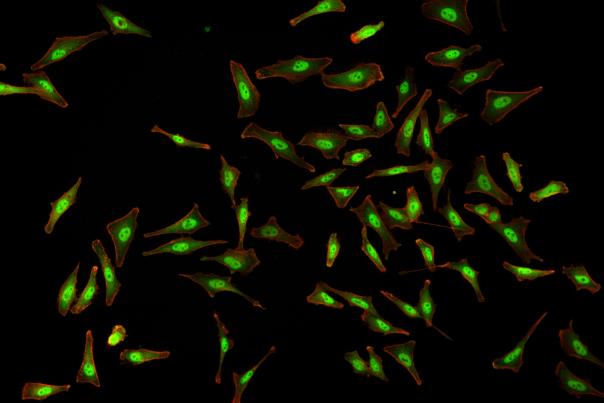
Alison obtained an F.R.S.-FNRS position as a Qualified Researcher (CQ) at the University of Namur, Department of Biology (URBC), and became a member of the NARILIS Institute in October 2022.
Alison Forrester | Express CV
Alison Forrester did her BSc in Pharmacology and PhD in Toxicology and Dermatology at the University of Newcastle, UK. Interested in autophagy and disease formation, she took a Postdoc position in Carmine Settembre’s lab at the Telethon Institute of Genetics and Medicine (TIGEM) in Naples, Italy then moved to Ludger Johannes’ lab at the Institute Curie in Paris, France.
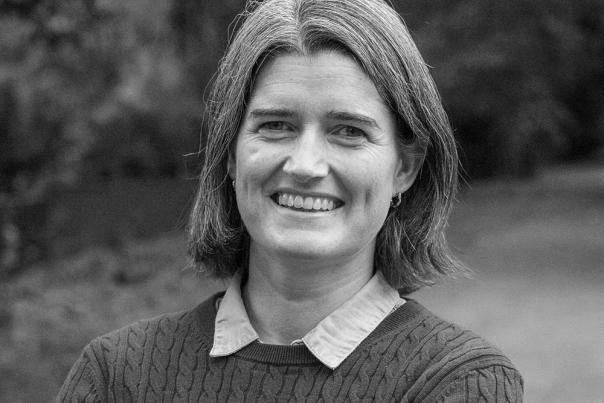
Since completing her PhD, she has built her expertise in advanced imaging techniques including confocal and high-resolution microscopy, live cell imaging, notably including Lattice Light-sheet microscopy, and electron microscopy).
She works in a highly collaborative and interdisciplinary environment, combining cell biology, chemical biology, advanced microscopy and image analysis to build fundamental projects that will develop into translation research.
Alison is passionate about creative, cutting-edge research without boundaries, working in multidisciplinary and collaborative environments. She is also passionate about sharing her enthusiasm for research and providing first-hand experiences to people through outreach initiatives and collaborations, seminars and conferences to the scientific community.
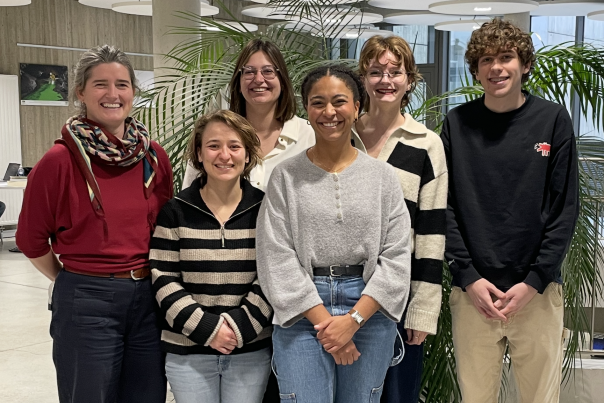
Alison Forrester organizes a monthly microscopy communitymeeting, open to all light microscopy users at the University of Namur and organises a number of prestigious international conferences, including the FEBS-EMBO Advanced Lecture course on membranes and their lipids and proteins in organelle biogenesis, which will be held on the Greek island of Spetses in May 2026.
Biology studies at UNamur
The Department of Biology at UNamur offers cutting-edge, modern, diverse, and internationally oriented scientific training. It offers bachelor's degrees as well as master's degrees with in-depth or specialized focus areas, as well as master's degrees in biology education. It is also possible to continue your education with a doctorate in one of the research units.
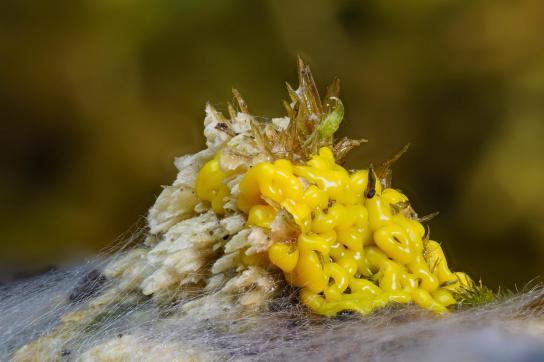
Blob in space: an unprecedented scientific mission
Blob in space: an unprecedented scientific mission
In the coming months, the University of Namur will participate in an exceptional space mission aboard the International Space Station (ISS), alongside Belgian astronaut Raphaël Liégeois. The BeBlob project, led by researchers Boris Hespeels (ILEE Institute) and Anne-Catherine Heuskin (NARILIS Institute), aims to study the DNA repair capabilities of a fascinating organism: the blob (Physarum polycephalum).
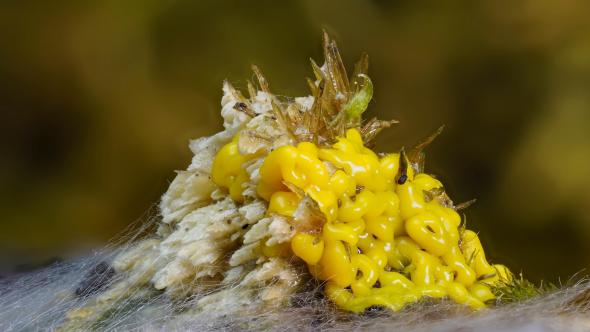
Astronaut Raphaël Liégeois will be carrying some rather unusual passengers in his luggage: dried blob samples, some of which have been irradiated with X-rays at UNamur. What are the Namur scientists hoping to achieve? They want to observe how this organism responds to the space environment and is able to repair its DNA in microgravity, and compare these results with those obtained in a similar experiment carried out on Earth. "In our laboratory, we simulate the stresses that the blob could undergo in space in order to assess its ability to survive and repair itself," explains Anne-Catherine Heuskin, professor in the Department of Physics.
Careful preparation and rigorous testing
While awaiting the rocket launch scheduled for 2027, researchers at UNamur are already actively preparing for the mission. For several months, they have been conducting a series of tests to ensure the reliability of the experiment: reaction to temperature variations, power failures, transport to the launch site in Florida, assembly of the mini-spacecraft that will house the samples, etc. "Every detail counts: even the choice of bags that protect the samples from light can influence the results," emphasizes Boris Hespeels.
Once on the ISS, Raphaël Liégeois will rehydrate the samples, culture them in a cabin on the station, and finally place them in a freezer at -80°C. "This procedure, which seems simple, becomes complex in zero gravity. We also have to ensure the stability of our samples, regardless of the timing of the experiment," continues Boris Hespeels. Inside the ISS, Raphaël Liégeois will have to carry out various experiments selected by the Belgian Science Policy Office (BELSPO). "And the order in which they will be carried out has not yet been determined," the two Namur-based researchers explain.

Major scientific and societal impacts
Post-mission analyses will identify cellular protection mechanisms under extreme conditions. These results could inspire the development of protective molecules for astronauts or patients undergoing radiotherapy. "Space remains a hostile environment. Understanding how living organisms adapt to it is essential for preparing future exploration," Boris Hespeels points out.
Finally, the BeBlob project also has an educational component: activities based on the blob will be offered in schools to raise awareness among young people about scientific research and space exploration. An ambitious project is also under consideration to enable students aged 8 to 18 to work directly on samples that took part in Raphaël Liégeois' mission aboard the ISS.
What is a blob?
The blob (Physarum polycephalum) is an extraordinary single-celled organism. It is neither animal, plant, nor fungus. Although it has no brain, it is capable of learning, memorizing, and solving complex problems. It can dry out completely and survive in extreme conditions, making it an ideal model for studying the resilience of living organisms. As part of the BeBlob project, researchers at UNamur have demonstrated this organism's exceptional resistance to ionizing radiation, up to a thousand times the lethal dose for humans!
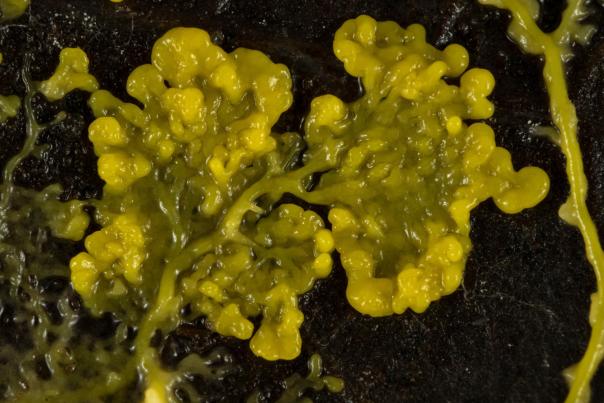
UNamur's expertise
The University of Namur is establishing itself as a key player in the study of the blob. Researchers at the LARN (Laboratory for Nuclear Reaction Analysis) and the ILEE (Institute of Life, Earth and Environment) and NARILIS (Namur Research Institute for Life Sciences) institutes have been conducting research into radiation resistance and DNA repair for several years. The BeBlob project builds on experience gained during previous space missions and active collaboration with ESA and BELSPO. The BeBlob project is one of three Belgian scientific experiments selected from 29 projects to be carried out during Belgian astronaut Raphaël Liégeois' mission scheduled for 2027. This scientific expertise places UNamur at the heart of space biology and fundamental research on life in extreme environments. The project is part of UNIVERSEH, the ERASMUS+ alliance of European universities that aims to build a "European university" focused on the space sector, of which UNamur is a member.
This article is taken from the "Eureka" section of Omalius magazine #39 (December 2025).
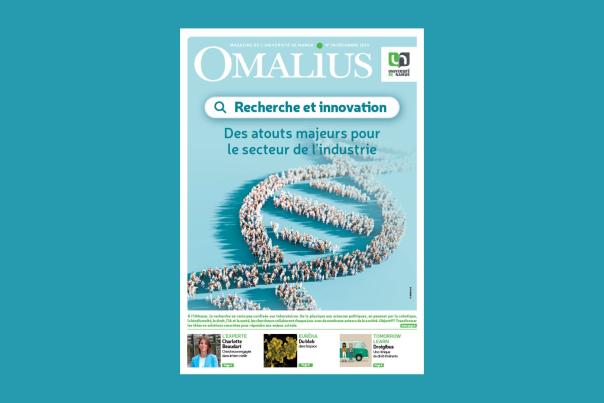

Delamination of sheepskin parchment: an interdisciplinary discovery published in Heritage Science
Delamination of sheepskin parchment: an interdisciplinary discovery published in Heritage Science
At UNamur, parchments are much more than objects of curiosity: they are at the heart of an interdisciplinary scientific adventure. Starting with historical sciences and conservation, the research has gradually incorporated the disciplines of physics, biology, chemistry, and archaeology. This convergence has given rise to research in heritage sciences, driving innovative projects such as Marine Appart's doctoral work, supervised by Professor Olivier Deparis. This research has now been recognized with a publication in the prestigious journal Heritage Science (Nature Publishing Group).

For several years now, heritage sciences have been experiencing a particularly significant boom. This deeply interdisciplinary field of research aims to foster dialogue between the humanities and natural sciences with a view to improving our knowledge of heritage objects, whether they be parchments, works of art, or artifacts discovered during excavations.
Manuscripts bear witness to ancestral practices and know-how, which unfortunately are poorly documented. It is still unclear why legal documents were preferably written on sheepskin parchment in England from the 13th century until 1925. Among the hypotheses put forward is the fact that sheepskin is whiter, and therefore more attractive, but above all that documents written on it were considered unforgeable due to the tendency of sheepskin to delaminate (any malicious attempt to erase the text would thus be revealed). This delamination property was exploited because it allowed the production of high-quality writing surfaces. It was also used to prepare strong repair pieces used to fill any tears that appeared during the parchment manufacturing process. Understanding why sheepskin delaminates is of interest in the context of traditional parchment preparation techniques, offering valuable insights into the interaction between animal biology, craftsmanship, and historical needs.
Delamination, what is it?
Delamination is the phenomenon whereby the inner layers of the skin separate along their interface as a result of mechanical stress. The diagram (a) below shows the structure of the skin, which consists mainly of the epidermis, dermis, and hypodermis. The dermis is divided into two layers, the papillary dermis and the reticular dermis, which contain hair, hair follicles, and sebaceous glands.

During the parchment manufacturing process, a step following liming involves scraping the skin to remove the hair. This step crushes the sebaceous glands, releasing fats and creating a void where the hair was located (diagram b).
The study showed that delamination occurs within the papillary dermis itself, in this structurally weakened area, rather than at the papillary-reticular junction as previously assumed.
The unique nature of the delamination process in sheepskin is highlighted by the skin structure, which differs from that of other animals (calves, goats) used to make parchment, as it has a high fat content associated with a large number of primary and secondary hair follicles. In the study, the presence of fats was confirmed using Raman spectroscopy.
The experimental manufacture of parchment - explained in a video!

This study combines experimental archaeology and advanced analytical techniques, including scanning electron microscopy (SEM) and micro-Raman spectroscopy, to characterize the delamination process and the adhesion of repair pieces on experimentally produced sheepskin parchment. It benefits from the expertise in archaeometry, biology, chemistry, and physics of the researchers involved.
Beyond its visual and structural implications, delamination has contributed to promoting the use of sheepskin for prestigious documents, improving the surface properties of parchment. The study of the interaction between metal-gallic ink and delaminated sheepskin (wetting experiments) showed that ink diffusion and writing quality are improved, a key finding that provides insight into how surface morphology and composition influence writing performance.
An international and multidisciplinary team
At UNamur, Marine Appart, a PhD student in physics, is conducting this multidisciplinary research on the archaeometry of delamination and repairs on a sheepskin parchment under the supervision of Professor Olivier Deparis (Department of Physics, NISM Institute).
Also part of the UNamur team are:
- Professor Francesca Cecchet (expert in Raman spectroscopy), Department of Physics, NARILIS and NISM Institutes
- Professor Yves Poumay (skin specialist), Department of Medicine, NARILIS Institute
- Dr. Caroline Canon (histology specialist), Department of Medicine
- Nicolas Gros (PhD student in heritage sciences), Department of Physics, NARILIS and NISM Institutes
Other international experts
- Professor Matthew Collins (world expert in biomolecular archaeology, Department of Archaeology, The McDonald Institute, University of Cambridge, Cambridge, UK)
- Jiří Vnouček (curator and expert in parchment production, Preservation Department, Royal Danish Library, Copenhagen, Denmark)
- Marc Fourneau (biologist)
History of the study of parchments at UNamur
This study and the resulting article were inspired by the delamination experiments conducted in 2023 by Jiří Vnouček during a symposium in Klosterneuburg, Austria, in which Prof. Olivier Deparis participated. The symposium was organized by Professor Matthew Collins as part of the ABC and ERC Beast2Craft (B2C) projects.
But it all began in 2014, when the Pergamenum21 project, dedicated to the transdisciplinary study of parchments, was launched. Pergamenum21 is a project of the Namur Transdisciplinary Research Impulse (NaTRIP) program at the University of Namur. The project received an additional grant in 2016 from the Jean-Jacques Comhaire Fund of the King Baudouin Foundation (FRB).
The projects and events followed one after another, including:
- May 2014: a transdisciplinary seminar on parchment, the scientific techniques used to characterize this material, and historical questions at the Mauretus Plantin Library (BUMP)
- May 2017: "Autopsy of a scriptorium: the Orval parchments put to the test of bioarchaeology," a transdisciplinary research project co-financed by the University of Namur and the Jean-Jacques Comhaire Fund of the King Baudouin Foundation
- April 2019: a publication in Scientific Reports, Nature group - Jean-Jacques Comhaire Prize: discovery of an innovative technique based on measuring the light scattered by ancient parchments. This technique makes it possible to characterize, in a non-invasive way, the nature of the skins used in the Middle Ages to make parchments
- September 2020: a residential workshop on making parchment from animal skins at the Domaine d'Haugimont – a first in Belgium
- July 2022: a new project on parchment bindings for the restoration workshop at the Moretus Plantin University Library (BUMP) thanks to the Jean-Jacques Comhaire Fund of the King Baudouin Foundation.
- September 2024: a residential symposium-workshop at the Domaine d'Haugimont on the theme of the physicochemistry of parchment and inks using experimental and historical approaches
Overall, the work of Marine Appart and her colleagues clarifies the structural and material factors that make sheepskin parchment susceptible to delamination and offers new insights into the surface properties of this ancient writing material. UNamur is now establishing itself as a major player in parchment research.
Professor Olivier Deparis, along with several of the researchers involved in this research, are also working on the ARC PHOENIX project. This project aims to renew our understanding of medieval parchments and ancient coins. Artificial intelligence is used to analyze the data generated by the characterization of materials. This joint study will address issues related to the production chain and the use of these objects and materials in past societies.

Plants against steatotic liver disease, a HEPATANT project!
Plants against steatotic liver disease, a HEPATANT project!
At UNamur, research is not confined to laboratories. From physics to political science, robotics, biodiversity, law, AI, and health, researchers collaborate daily with numerous stakeholders in society. The goal? To transform ideas into concrete solutions to address current challenges.

Focus #1 | The HEPATANT project
HEPATANT is a project run by the Wagralim Competitiveness Cluster and coordinated by ORTIS Laboratories, a company that has been a pioneer in the field of phytosanitary products (plant-based dietary supplements) for 60 years. It aims to find a natural treatment for fatty liver disease. Several partners are involved in the project, including Professor Thierry Arnould (UNamur, URBC-Narilis).

Our metabolism naturally leads to the accumulation or synthesis of fat. Certain cells are designed for this purpose: these are called adipocytes. The main goal is to be able to mobilize fat and release fatty acids "when needed." The problem is that if there is an excess of nutrients, certain cells in the body, which are not designed to do so, can also accumulate fat in tissues such as the liver, heart, or muscles, which can cause health problems. This is known as "lipotoxicity."
Metabolic dysfunction-associated steatotic liver disease (MASLD) is an accumulation of fat in the liver linked to metabolic disorders associated with metabolic syndrome, obesity, diabetes, or excessive alcohol consumption. Initially, it is often asymptomatic but can progress to inflammation, fibrosis, cirrhosis, or even liver cancer. However, it is reversible in its early stages (steatosis). Treatment is based on weight loss, a healthy diet (reduced sugar/fat intake), and physical exercise, as few specific drugs have been approved by the FDA (Food and Drug Administration) at this time. Dietary supplements—based on plants known to be beneficial—are often used to treat this type of condition, but there is little or no scientific and mechanistic evidence on the actual effects of these products.
If the effectiveness of a dietary supplement or combination of supplements could be demonstrated, it would be possible to intervene at the primary stage of the condition and undoubtedly prevent this liver disorder, thereby halting or at least slowing its progression to advanced or even irreversible stages. This is the aim of this project, in which Professor Thierry Arnould was chosen for his expertise in lipid metabolism. Professor Arnould and postdoctoral researcher Célia Thomas are testing plant extracts (including hops) in vitro on fat-laden cells to investigate the effects that increase or decrease lipid accumulation.
The originality and feasibility of the project lie in the alliance of scientific experts internationally recognized for their expertise in biomedical and pharmaceutical sciences, and in technological and agronomic sciences, with renowned industrialists in their field of expertise related to the project's needs.
In addition to its main objective of creating an effective formulation against hepatic steatosis by combining the best plants or plant substances, this project also aims to generate economic growth, create and sustain jobs in Wallonia, and contribute to the international reputation of the Walloon partner universities: UCLouvain and UNamur.
The partners of the HEPATANT project
- Prof. Thierry Arnould – UNamur, URBC, Narilis | Expertise: The URBC-NARILIS laboratory has extensive expertise and experience in cell differentiation, metabolism, and lipid metabolism in obesity and adipose cells. It also has excellent expertise in the field of hepatocytes and hepatogenic differentiation from precursors and stem cells (collaboration with Professor P. Renard, UNamur, URBC-NARILIS).
- Prof. Isabelle Leclercq - UCLouvain (IREC/GAEN) | Expertise: Pathogenesis of liver diseases in in vivo models.
- Remi Desmet – UCLouvain (Louvain University Farms - FERM) | Expertise: Agronomic research - As a UCLouvain technology platform, FERM works with farmers and partners to support the transition to more sustainable agricultural models.
- Alexandre Dumont de Chassart - Yakima Chief Hops | Expertise: Production of hops and hop-derived products.
- Caroline Devillers – Bel go Bio | Expertise: Agricultural cooperative
Competitiveness Clusters in the Walloon Region
Since their creation in 2006, competitiveness clusters have brought together companies, accredited research centers, and universities around ambitious collaborative projects. Supported and funded by the Walloon Region to stimulate innovation and economic growth, competitiveness cluster projects are organized around six strategic sectors: biotechnology (BioWin), aerospace (SkyWin Wallonia), logistics (Logistics in Wallonia), green chemistry (GreenWin), mechanical engineering (Mecatech), and food system transition (Wagralim). aerospace (SkyWin Wallonia), logistics (Logistics in Wallonia), green chemistry (GreenWin), mechanical engineering (Mecatech), and food system transition (Wagralim).
The projects aim to develop innovative products, services, or processes, creating jobs and strengthening international competitiveness. UNamur is heavily involved in these projects.
Wagralim, the Walloon agri-food cluster, has more than 300 members working to stimulate innovation and collaboration within the food ecosystem and support stakeholders in their responsible development and sustainable transition.

From fundamental to applied research, UNamur demonstrates every day that research is a driver of transformation. Thanks to the commitment of its researchers, the support of its partners from all walks of life, funders, industrial partners, and a solid ecosystem of valorization, UNamur actively participates in shaping a society that is open to the world, more innovative, more responsible, and more sustainable.
To go further
This article complements our publication "Research and innovation: major assets for the industrial sector" taken from the Issues section of Omalius magazine #39 (December 2025).

A multidisciplinary framework for protein trafficking: tackling unanswered questions
A multidisciplinary framework for protein trafficking: tackling unanswered questions
Alison Forrester is a F.R.S.-FNRS Qualified Researcher (CQ). Her research focuses on studying compounds that can modify the efficiency of protein production processes within our cells, and thus open up new therapeutic avenues. Together with a group of top international researchers, she has published a road map article in the prestigious journal Nature Reviews Molecular Cell Biology.

Alison Forrester is also a member of the Faculty of Science, Department of Biology (URBC), a member of the NARILIS Research Institute, a researcher at the Namur Research College (NARC), and an investigator at the WEL Research Institute.
The importance of protein trafficking in cellular health
The mammalian body is made up of proteins, lipids and water, with proteins making up 42 % of the total dry mass of a human body. Therefore, protein synthesis is a key process for the body. The biosynthetic pathway begins with amino acid chains in the Endoplasmic Reticulum (ER). They are modified, folded and then packaged into transport carriers at the ER Exit Site (ERES), transporting them to the Golgi for further modification. From there they are packaged into post-Golgi carriers to deliver the fully folded proteins to their destination, either inside the cell, or to the plasma membrane where they remain, or they are secreted into the extracellular space. Thus, efficient protein synthesis and transport is a key process to maintain homeostasis.
When it is lost, it can cause many common and varied diseases. The process is highly regulated to quickly meet the needs of the cell and the body, for example, increase in secretion of insulin in response to glucose, or increase in collagen secretion during postnatal growth, and also to ensure that no improperly made proteins are distributed throughout the cell.
When this goes wrong, it can be the cause of diseases such as fibrosis which is caused by excessive protein production, or osteogenesis imperfecta which is caused by a mutation in one of the ERES proteins.
Alison’s research group studies how different compounds can be used to modify the efficiency of the protein trafficking process, and how this will affect the normal balance within the cell.
A bit of biology
This roadmap article provides a total view of Endoplasmic Reticulum (ER) exit sites (ERES), specialized subdomains of the ER where folded proteins are selected and packaged into membrane-bound carriers that transport the nascent proteins on the first main step of their journey to be secreted. The discovery of ERES is not new, and the foundational discoveries of protein and lipid trafficking were awarded the Nobel prize in 2013. However, new technologies now allow us to revisit the original hypotheses, as well as to drive the field further than ever before. This renaissance has uncovered new exciting areas in this field that are discussed in this roadmap article, including how ERES are actually organised, how they can adapt their function to other known physiological roles such as autophagy and lipid droplet formation, and how the process of protein recruitment and trafficking can be regulated pharmacologically. It is the latter question that Alison Forrester is interested in addressing.
Protein trafficking dysfunction, including misfolding or aggregation, excessive or decreased protein transport, and the stress responses linked to these dysfunctions are at the heart of many cellular pathologies, ranging from neurodegenerative diseases (Alzheimer's or Parkinson's diseases), where the accumulation of toxic proteins disrupts neuronal function and kills cells; cancer, affecting cell division, migration and survival; to protein transport disorders arising from mutations in the cargo, such as cystic fibrosis. These alterations lead to an overload of quality control systems (including ER-stress and autophagy) and serious pathologies, highlighting the importance of protein transport for cellular health.
Cutting-edge technologies
In the article, published in Nature Reviews Molecular Cell Biology, the researchers propose a multidisciplinary framework — leveraging advances in the recent progress in certain technologies including high and super-resolution imaging, synthetic reconstitution and computational modelling — to delineate the principles governing the function and plasticity of ERES. Here, the University of Namur is well positioned to provide the tools needed by Dr Forrester’s team.
The Morphology and Imaging Platform (Morph-IM) – Optical Microscopy
This platform is home to cutting edge microscopes that her team uses in these studies. Medium throughput confocal microscopes allow Dr Forrester’s team to screen compounds to identify their effect on the secretory pathway. 4-dimensional high-speed imaging using the Lattice light-sheet microscope will allow her team to track 3D movement of cargo proteins through the whole cell volume at 2 second intervals, and super-resolution live cell imaging will allow to identify which proteins are involved at single ERES during different states of ER exit and for different cargo.
This holds significant potential for developing targeted therapeutic strategies in diseases linked to trafficking dysfunction.

Alison obtained an F.R.S.-FNRS position as a Qualified Researcher (CQ) at the University of Namur, Department of Biology (URBC), and became a member of the NARILIS Institute in October 2022.
Alison Forrester | Express CV
Alison Forrester did her BSc in Pharmacology and PhD in Toxicology and Dermatology at the University of Newcastle, UK. Interested in autophagy and disease formation, she took a Postdoc position in Carmine Settembre’s lab at the Telethon Institute of Genetics and Medicine (TIGEM) in Naples, Italy then moved to Ludger Johannes’ lab at the Institute Curie in Paris, France.

Since completing her PhD, she has built her expertise in advanced imaging techniques including confocal and high-resolution microscopy, live cell imaging, notably including Lattice Light-sheet microscopy, and electron microscopy).
She works in a highly collaborative and interdisciplinary environment, combining cell biology, chemical biology, advanced microscopy and image analysis to build fundamental projects that will develop into translation research.
Alison is passionate about creative, cutting-edge research without boundaries, working in multidisciplinary and collaborative environments. She is also passionate about sharing her enthusiasm for research and providing first-hand experiences to people through outreach initiatives and collaborations, seminars and conferences to the scientific community.

Alison Forrester organizes a monthly microscopy communitymeeting, open to all light microscopy users at the University of Namur and organises a number of prestigious international conferences, including the FEBS-EMBO Advanced Lecture course on membranes and their lipids and proteins in organelle biogenesis, which will be held on the Greek island of Spetses in May 2026.
Biology studies at UNamur
The Department of Biology at UNamur offers cutting-edge, modern, diverse, and internationally oriented scientific training. It offers bachelor's degrees as well as master's degrees with in-depth or specialized focus areas, as well as master's degrees in biology education. It is also possible to continue your education with a doctorate in one of the research units.

Blob in space: an unprecedented scientific mission
Blob in space: an unprecedented scientific mission
In the coming months, the University of Namur will participate in an exceptional space mission aboard the International Space Station (ISS), alongside Belgian astronaut Raphaël Liégeois. The BeBlob project, led by researchers Boris Hespeels (ILEE Institute) and Anne-Catherine Heuskin (NARILIS Institute), aims to study the DNA repair capabilities of a fascinating organism: the blob (Physarum polycephalum).

Astronaut Raphaël Liégeois will be carrying some rather unusual passengers in his luggage: dried blob samples, some of which have been irradiated with X-rays at UNamur. What are the Namur scientists hoping to achieve? They want to observe how this organism responds to the space environment and is able to repair its DNA in microgravity, and compare these results with those obtained in a similar experiment carried out on Earth. "In our laboratory, we simulate the stresses that the blob could undergo in space in order to assess its ability to survive and repair itself," explains Anne-Catherine Heuskin, professor in the Department of Physics.
Careful preparation and rigorous testing
While awaiting the rocket launch scheduled for 2027, researchers at UNamur are already actively preparing for the mission. For several months, they have been conducting a series of tests to ensure the reliability of the experiment: reaction to temperature variations, power failures, transport to the launch site in Florida, assembly of the mini-spacecraft that will house the samples, etc. "Every detail counts: even the choice of bags that protect the samples from light can influence the results," emphasizes Boris Hespeels.
Once on the ISS, Raphaël Liégeois will rehydrate the samples, culture them in a cabin on the station, and finally place them in a freezer at -80°C. "This procedure, which seems simple, becomes complex in zero gravity. We also have to ensure the stability of our samples, regardless of the timing of the experiment," continues Boris Hespeels. Inside the ISS, Raphaël Liégeois will have to carry out various experiments selected by the Belgian Science Policy Office (BELSPO). "And the order in which they will be carried out has not yet been determined," the two Namur-based researchers explain.

Major scientific and societal impacts
Post-mission analyses will identify cellular protection mechanisms under extreme conditions. These results could inspire the development of protective molecules for astronauts or patients undergoing radiotherapy. "Space remains a hostile environment. Understanding how living organisms adapt to it is essential for preparing future exploration," Boris Hespeels points out.
Finally, the BeBlob project also has an educational component: activities based on the blob will be offered in schools to raise awareness among young people about scientific research and space exploration. An ambitious project is also under consideration to enable students aged 8 to 18 to work directly on samples that took part in Raphaël Liégeois' mission aboard the ISS.
What is a blob?
The blob (Physarum polycephalum) is an extraordinary single-celled organism. It is neither animal, plant, nor fungus. Although it has no brain, it is capable of learning, memorizing, and solving complex problems. It can dry out completely and survive in extreme conditions, making it an ideal model for studying the resilience of living organisms. As part of the BeBlob project, researchers at UNamur have demonstrated this organism's exceptional resistance to ionizing radiation, up to a thousand times the lethal dose for humans!

UNamur's expertise
The University of Namur is establishing itself as a key player in the study of the blob. Researchers at the LARN (Laboratory for Nuclear Reaction Analysis) and the ILEE (Institute of Life, Earth and Environment) and NARILIS (Namur Research Institute for Life Sciences) institutes have been conducting research into radiation resistance and DNA repair for several years. The BeBlob project builds on experience gained during previous space missions and active collaboration with ESA and BELSPO. The BeBlob project is one of three Belgian scientific experiments selected from 29 projects to be carried out during Belgian astronaut Raphaël Liégeois' mission scheduled for 2027. This scientific expertise places UNamur at the heart of space biology and fundamental research on life in extreme environments. The project is part of UNIVERSEH, the ERASMUS+ alliance of European universities that aims to build a "European university" focused on the space sector, of which UNamur is a member.
This article is taken from the "Eureka" section of Omalius magazine #39 (December 2025).

Agenda
IBAF Conference 2026
Sixteen years after hosting the 2010 edition, UNamur is delighted to revive this scientific tradition and welcome the 11th edition of the Rencontres Ion Beam Applications Francophones (IBAF). This edition will be organized by scientists from the UNamur Physics Department who are active in the fields of materials science, biophysics, and interdisciplinary applications of ion beams.

The IBAF Meetings have been organized since 2003, every two years since 2008, by the Ion Beams Division of the French Vacuum Society (SFV), the oldest national vacuum society in the world, which celebrated its 80th anniversary in 2025.
As in previous editions, IBAF 2026 will offer a rich and varied program with guest lectures, oral and poster presentations, and technical sessions. All this will be complemented by an industrial presence to promote exchanges between research and innovation.
The conference will cover a wide range of topics, from ion beam instruments and techniques to the physics of ion-matter interactions, including the analysis and modification of materials, applications in the life sciences, earth and environmental sciences, and heritage sciences.
Ce contenu est en cours de migration. Retrouvez toutes les informations utiles sur le site web externe de l'Institut Narilis.



